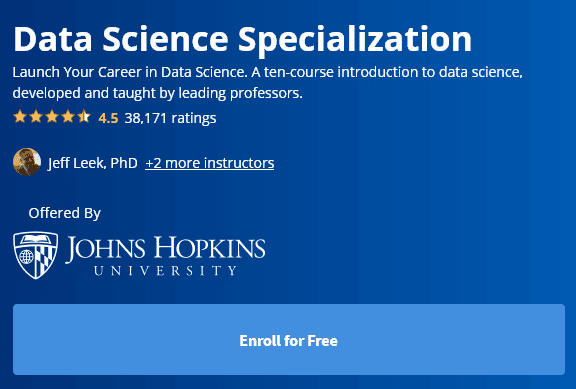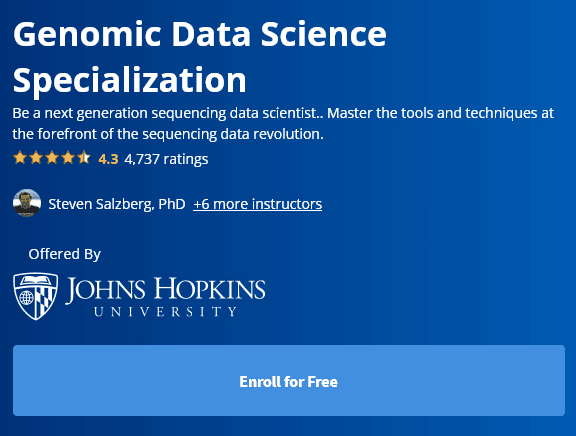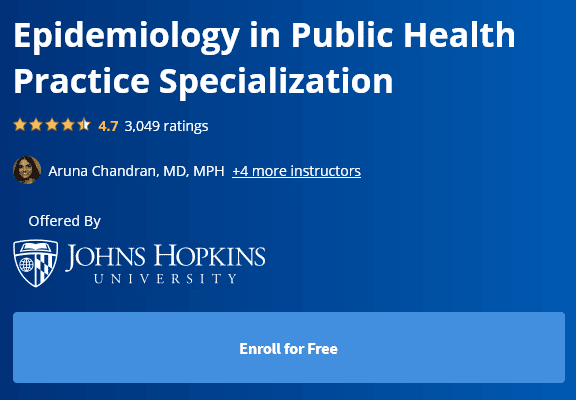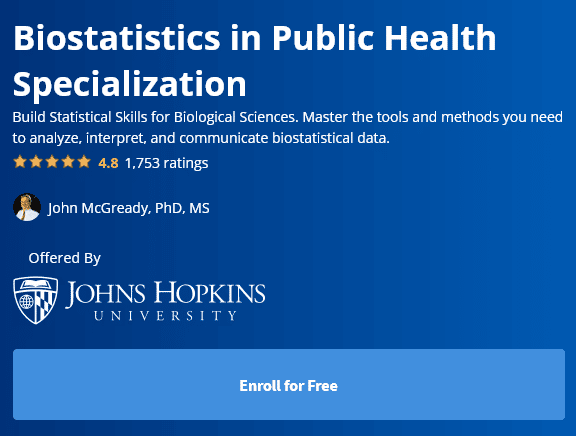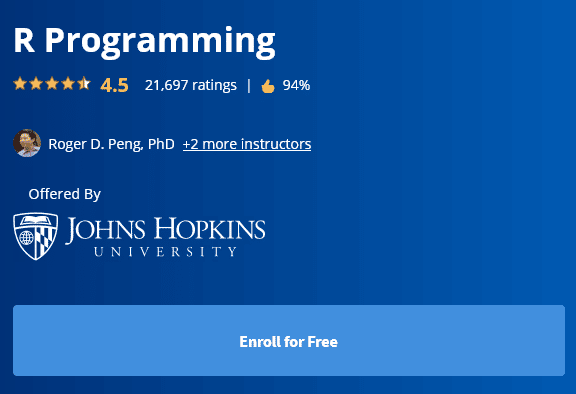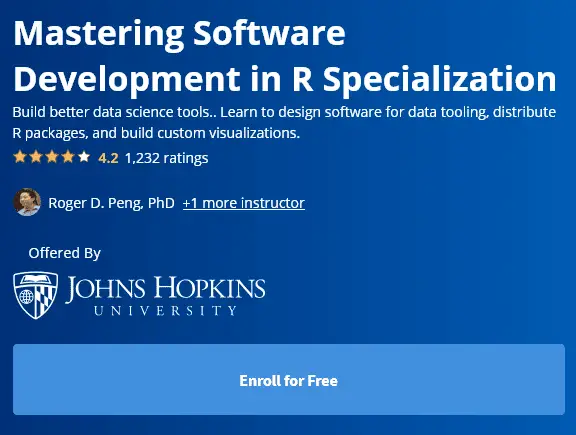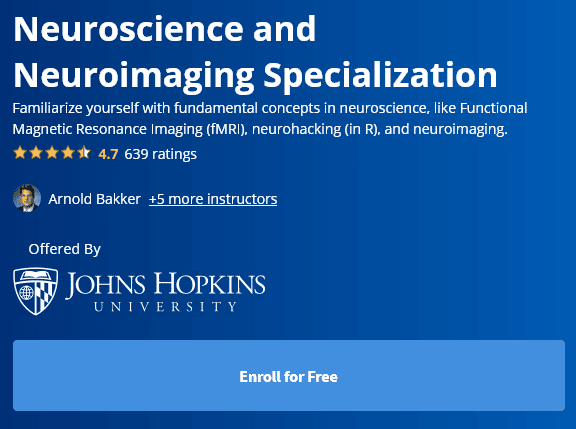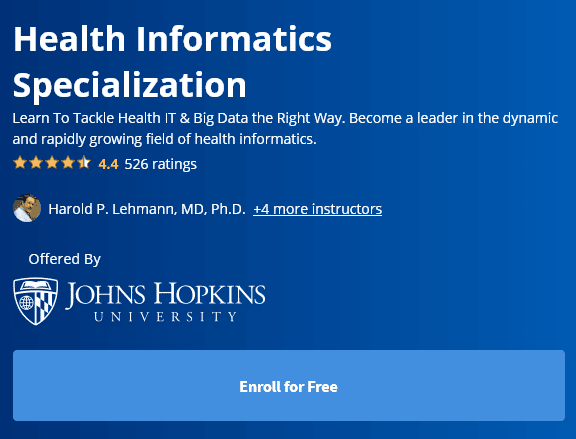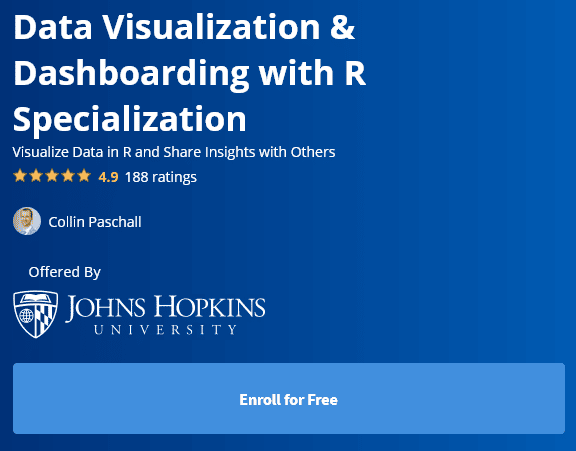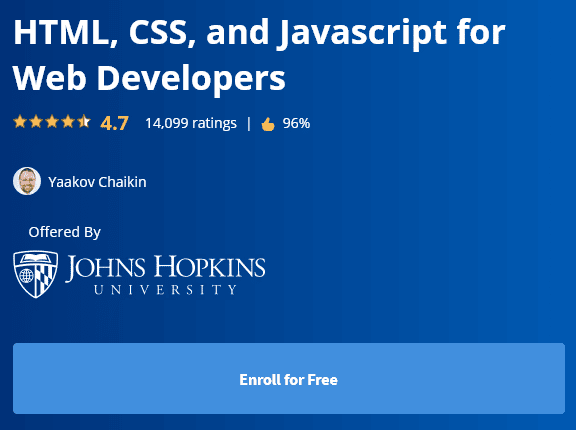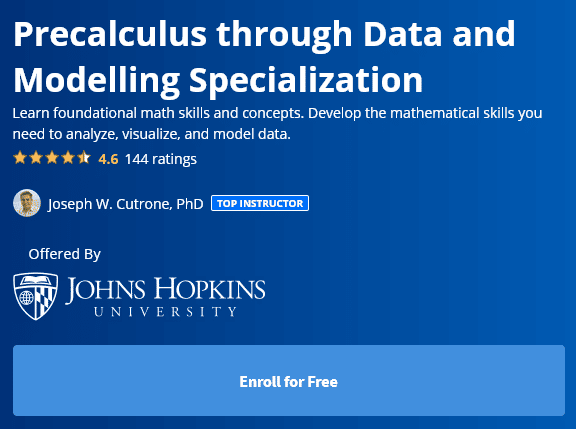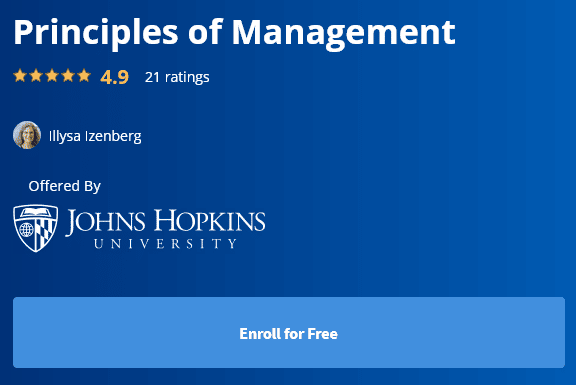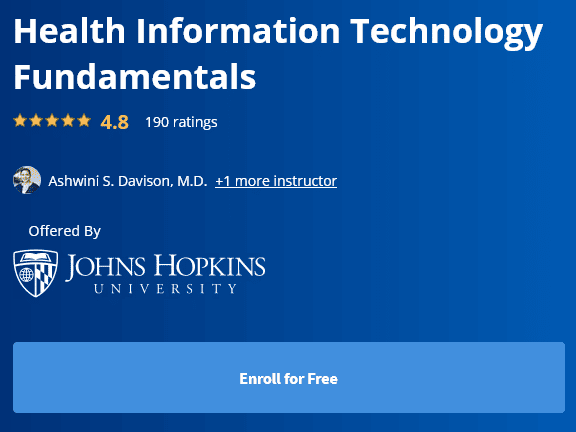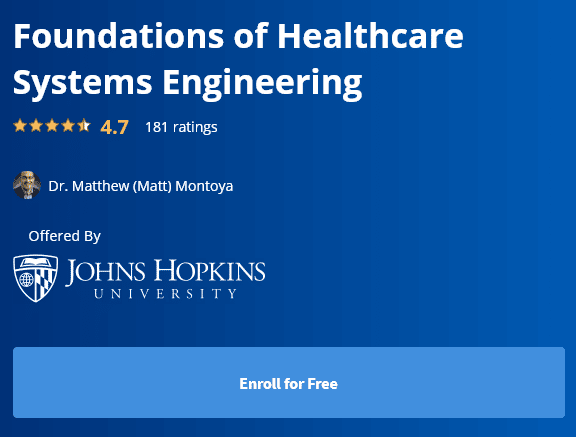If you’re looking to beef up your resume with some extra coursework, or if you’re just interested in learning more about a certain topic, Johns Hopkins offers a number of free online courses that you can take at your own pace. Whether you’re a beginner or an experienced learner, there’s sure to be a course that piques your interest.
The courses on this page are divided into five categories: data science, business and management, health and life sciences, mathematics, and computer science.
Table of Contents
Johns Hopkins Free Online Courses
Data Science Specialization
The Data Science Specialization from Johns Hopkins is a great way to get started in this exciting field. The specialization includes ten courses covering topics such as data mining, machine learning, and data visualization.
You will also have the opportunity to complete a Data Science Capstone project, incorporating all that you have learned into a real-world application. Best of all, the courses are offered entirely for free online, so you can study at your own pace.
Whether you are just getting started in your data science journey or looking to take your career to the next level, this specialization is one of the best ways to learn more about this ever-growing field.
Genomic Data Science Specialization
The Genomic Data Science Specialization from Johns Hopkins University is a comprehensive program that covers everything from the basics of genomic technologies to more advanced topics like algorithms for DNA sequencing and statistical analysis.
The six courses in the specialization are all available online and can be completed at your own pace. The first course, Introduction to Genomic Technologies, provides an overview of the field of genomic data science and introduces the major concepts and methods used in genomic research.
The second course, Python for Genomic Data Science, covers the basics of programming in Python, which is a common language used in genomic data analysis.
The third course, Algorithms for DNA Sequencing, covers sophisticated methods for analyzing DNA sequence data.
The fourth course, Command Line Tools for Genomic Data Science, introduces students to the command line interface, which is a powerful tool for managing and analyzing genomic data.
The fifth course, Bioconductor for Genomic Data Science, covers tools and methods for analyzing genomic data using the Bioconductor software package.
The final course in the specialization, Statistics for Genomic Data Science, covers important statistical methods used in genomic data analysis.
Epidemiology in Public Health Practice Specialization
The Epidemiology in Public Health Practice Specialization that is offered by Johns Hopkins is designed to provide participants with the skills and knowledge necessary to effectively use epidemiological principles in public health practice.
The specialization is made up of five courses, each of which focuses on a different aspect of epidemiology. The first course, Essential Epidemiologic Tools for Public Health Practice, covers the basic concepts and methods of epidemiology.
The second course, Data and Health Indicators in Public Health Practice, explores how to use data to inform public health decision-making. The third course, Surveillance Systems: The Building Blocks, discusses the components of effective surveillance systems.
The fourth course, Surveillance Systems: Analysis, Dissemination, and Special Systems, focuses on how to analyze and disseminate surveillance data.
The fifth and final course, Outbreaks and Epidemics, explores how epidemics emerge and how they can be controlled. Together, these courses provide a comprehensive introduction to the field of epidemiology and its role in public health.
Biostatistics in Public Health Specialization
The Biostatistics in Public Health Specialization from Johns Hopkins University is a series of four free online courses that cover essential topics in Biostatistics.
The first course, Summary Statistics in Public Health, covers basic concepts in Biostatistics, such as measures of variability, probability, and distributions.
The second course, Hypothesis Testing in Public Health, covers t-tests, chi-square tests, and regression analysis.
The third course, Simple Regression Analysis in Public Health, covers simple linear regression analysis and how to interpret the results of a regression analysis.
The fourth course, Multiple Regression Analysis in Public Health, covers multiple linear regression analysis and how to interpret the results of a multiple regression analysis.
These courses are essential for anyone who wants to understand Biostatistics or build a career in public health.
R Programming
R is a programming language that is commonly used for statistical computing and data analysis. The R programming language is open source and has a wide variety of packages that allow users to perform many different statistical and data analysis tasks. The Johns Hopkins Free Online Course “Programming with R” covers the basics of the R programming language and how to use R for statistical computing and data analysis.
The course covers topics such as loops, debugging, simulation, and profiling. The course is aimed at beginners to R programming, but it will also be beneficial for experienced programmers who want to learn how to use R for statistical computing and data analysis.
Mastering Software Development in R Specialization
Johns Hopkins offers a Mastering Software Development in R Specialization, which consists of five courses.
Course 1, The R Programming Environment, covers the basics of the R programming language.
Course 2, Advanced R Programming, covers more advanced topics such as working with data structures and writing efficient functions.
Course 3, Building R Packages, covers how to create and distribute packages for the R programming language.
Course 4, Building Data Visualization Tools, covers how to create visualizations using the R programming language.
The Mastering Software Development in R Capstone course puts all of the knowledge learned in the previous four courses to the test by having students build a complete software development project from start to finish. If you’re looking to improve your skills in the R programming language, this specialization is a great place to start.
Neuroscience and Neuroimaging Specialization
Neuroscience and Neuroimaging Specialization from Johns Hopkins University contains four courses that will introduce you to the fundamentals of Neuroscience and how to image the brain.
The first course, Fundamental Neuroscience for Neuroimaging, covers basic Neuroscience concepts like the function of neurons and how they communicate with each other.
The second and third courses, Principles of fMRI 1 & 2, cover how to use Functional Magnetic Resonance Imaging (fMRI) to image the brain.
The fourth and final course, Introduction to Neurohacking in R, will teach you how to use the programming language R to analyze Neuroscience data.
By the end of this Neuroscience specialization, you will have a strong foundation in Neuroscience and be able to apply neuroimaging techniques to research questions.
Health Informatics Specialization
The Health Informatics Specialization, offered by Johns Hopkins University on Coursera, provides a comprehensive introduction to Health Informatics for anyone who wants to learn about this growing field.
The specialization includes five courses that cover everything from the social and technical context of Health Informatics to leading change in Health Informatics. You’ll also learn about the outcomes and interventions of Health Informatics as well as the data science of Health Informatics.
And finally, you’ll complete a Project in Health Informatics that will allow you to put your new knowledge into practice.
Whether you’re already working in Health Care or simply want to learn more about this important topic, the Health Informatics Specialization is a great way to get a head start.
Data Visualization & Dashboarding with R Specialization
Johns Hopkins offers a Data Visualization and Dashboarding with R specialization, consisting of five courses.
The first course, Getting Started with Data Visualization in R, covers the basics of visualizing data in R.
The second course, Data Visualization in R with ggplot2, builds on this foundation by teaching students how to create sophisticated visualizations using the ggplot2 package.
The third course, Advanced Data Visualization with R, dives into more advanced topics like visualizing time series data and creating 3D plots.
The fourth course, Publishing Visualizations in R with Shiny and flexdashboard, covers how to create interactive web applications using R.
Finally, the Data Visualization Capstone puts all of these skills to the test by having students build their own data visualization project from start to finish.
Whether you’re a beginner just getting started with data visualization or a seasoned pro looking to brush up on your skills, Johns Hopkins’ Data Visualization and Dashboarding with R specialization has something for everyone.
HTML, CSS, and Javascript for Web Developers
HTML, CSS, and JavaScript are the three essential technologies for building web pages and web applications. This Johns Hopkins Programing Course will teach you the basics of HTML and CSS, including how to create and style your own web pages. You’ll also learn how to use JavaScript to add interactivity to your web pages and build simple web applications. By the end of the course, you’ll have a strong foundation in HTML, CSS, and JavaScript that you can use to start building your own websites and applications.
Algebra: Elementary to Advanced Specialization
The Algebra: Elementary to Advanced Specialization from Johns Hopkins University will give you a deep understanding of this vital subject. The specialization is comprised of three courses.
In the first course, you’ll learn about equations and inequalities, and how to solve them.
The second course introduces functions and their applications, while the third course covers polynomials and roots.
By the end of the specialization, you’ll be able to confidently use Algebra to solve complex mathematical problems. And best of all, the courses are offered entirely online, so you can study at your own pace. Whether you’re a math novice or a seasoned pro, this specialization is an excellent way to deepen your knowledge of Algebra.
Precalculus through Data and Modelling Specialization
Precalculus through Data and Modelling Specialization is a free online course offered by Johns Hopkins University. It consists of three courses: Precalculus: Relations and Functions, Precalculus: Periodic Functions, Precalculus: Mathematical Modeling.
This specialization is designed for students who wish to improve their understanding of precalculus concepts and learn how to apply them to real-world data. The courses cover a wide range of topics, including functions, graphing, transformations, trigonometry, and exponential and logarithmic functions.
By the end of the specialization, students will be able to use precalculus to model and solve problems in the real world.
Differential Calculus through Data and Modeling Specialization
The Differential Calculus through Data and Modeling Specialization offered by Johns Hopkins University on Coursera is your chance to learn this fundamental tool used by scientists, engineers, and economists around the world.
The specialization comprises four courses: Precalculus Review, Limits & Derivatives, Differentiation Rules, and Applying Differentiation. In this course series, you’ll develop a strong foundation in differential calculus by exploring real-world applications in data science, engineering, and economics.
Whether you’re looking to launch or further your career in one of these fields or you simply want to learn more about how differential calculus helps us understand our world, this specialization is for you. And with Coursera’s flexible learning platform, you can study at your own pace and join a community of learners from around the world.
Principles of Management
Johns Hopkins’ Principles of Management online course offers students a comprehensive overview of the key concepts and skills necessary for success in any management role.
The course is divided into four modules: Communicating with Direct Reports & Teams, Coaching Direct Reports & Teams, Making High-Quality Ethical Decisions, and Strategy, Priorities, & Projects.
Each module contains a series of lectures, readings, and exercises designed to give students a thorough understanding of the material. In addition, the course offers numerous opportunities for interaction and feedback from both instructors and classmates.
Health Information Technology Fundamentals
Health Information Technology Fundamentals is a free online course offered by Johns Hopkins that covers the basic concepts and applications of HIT. The course is designed for anyone who wants to learn more about how electronic health records (EHRs) work, what features they offer, and how they can be used to support clinical decision-making. The course also covers important topics such as training and communication, change management, and database design. By the end of the course, students will have a solid understanding of the key components of HIT and how they can be used to improve patient care.
Foundations of Healthcare Systems Engineering
The Foundations of Healthcare Systems Engineering online course from Johns Hopkins University is a four-week course that covers the basics of healthcare systems engineering. The course is designed for anyone interested in learning about how to improve healthcare through systems engineering, and no prior knowledge is necessary. Each week of the course focuses on a different topic, and the entire course can be completed in as little as two hours per week.
In the first week, you will be introduced to the drivers and needs to improve healthcare and how systems engineering can enable this betterment. You will also learn about different system types and their characteristics.
In the second week, you will delve deeper into the systems engineering approach, learning how to apply it to healthcare challenges. Finally, in the third and fourth weeks, you will put your knowledge into practice by working on real-world healthcare applications.


